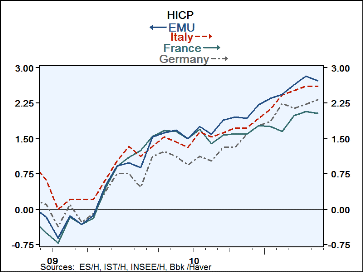 Global| Jun 16 2011
Global| Jun 16 2011Zone Inflation Sort of Stops Rising
Summary
While headline Zone inflation hits 0% in May and the core edged up by just 0.1% the trends continue to point higher. What is really going on with inflation will play out over the coming months. Since commodity prices have broken their [...]
 While headline Zone inflation hits 0% in May and the core edged up by just 0.1% the trends continue to point higher.
What is really going on with inflation will play out over the coming months. Since commodity prices have broken their
up trends to some extent and, since there is a slowing in place, there is some optimism that this statistically
unreliable indication that inflation really is slowing may actually be the real thing. But it is really too soon to tell.
While headline Zone inflation hits 0% in May and the core edged up by just 0.1% the trends continue to point higher.
What is really going on with inflation will play out over the coming months. Since commodity prices have broken their
up trends to some extent and, since there is a slowing in place, there is some optimism that this statistically
unreliable indication that inflation really is slowing may actually be the real thing. But it is really too soon to tell.
EMU's 3-month inflation is lower than the annualized six-month rate by a few ticks of the compounded annualized growth rate. That and $2.50 can get you a cup of coffee at Starbucks.
As we look to the country detail we find that the three-month rates of inflation are on the rise In France, Italy, and in Spain. In Germany the pace of headline inflation is lower over three-months compared to six months. But all large EMU nations show inflation is up for six-months compared to twelve-months.
Core inflation which is not a focus of the ECB but is still a very important statistic because it tells more of the definitive turn in the inflation trend, shows that inflation is still accelerating from 12-months to six-months to three-months across these countries with the exception of the UK where inflation has cooled from six-months to three-months. Still, the UK six month inflation rate is huge at 4.1% and at 2.8% its three-month inflation rate is still not at a very satisfying level.
On balance the supporting inflation numbers are still not there in on a broad-based level across countries. The best of the EMU trends is seen is in the headline rate which is the ECB's policy focus. Still that rate is at 2.7% Yr/Yr which is too high, over the 2% ceiling and the 3-month pace, while lower than the 3.2% over six months, at 3% is still excessive. There are some hopeful trends here but there is nothing definitive. As we know the ECB does not make its monetary policy on hope. Despite ongoing debt issues in the Zone the recent drop in UK retail sales in May and other signs of slowing, the Zone remains on tenuous ground as far as ECB policy is concerned.
| Trends in HICP | |||||||
|---|---|---|---|---|---|---|---|
| %Mo/Mo | %SAAR | ||||||
| May-11 | Apr-11 | Mar-11 | 3Mo | 6Mo | 12Mo | Yr Ago | |
| EMU | 0.0% | 0.3% | 0.5% | 3.0% | 3.2% | 2.7% | 1.7% |
| Core | 0.1% | 0.2% | 0.6% | 4.0% | 2.2% | 1.7% | 0.9% |
| HICP | |||||||
| Germany | -0.2% | 0.3% | 0.5% | 2.6% | 3.0% | 2.4% | 1.2% |
| France | 0.0% | 0.2% | 0.5% | 2.9% | 2.7% | 2.2% | 1.9% |
| Italy | 0.2% | 0.3% | 0.6% | 4.3% | 3.4% | 2.9% | 1.5% |
| UK | 0.0% | 0.8% | 0.1% | 3.4% | 5.8% | 4.5% | 3.3% |
| Spain | -0.1% | -0.1% | 1.9% | 6.9% | 4.9% | 3.4% | 2.5% |
| Core:xFE&A | |||||||
| Germany | -0.1% | 0.5% | 0.2% | 2.3% | 1.7% | 1.4% | 0.6% |
| France | 0.1% | 0.3% | 0.2% | 2.8% | 1.7% | 1.4% | 0.8% |
| Italy | -0.1% | 0.5% | 1.0% | 5.9% | 2.7% | 2.2% | 1.5% |
| UK | -0.1% | 0.8% | 0.0% | 2.8% | 4.1% | 3.5% | 2.8% |
| Spain | 0.1% | -0.5% | 2.0% | 6.5% | 2.9% | 2.0% | 0.9% |
Robert Brusca
AuthorMore in Author Profile »Robert A. Brusca is Chief Economist of Fact and Opinion Economics, a consulting firm he founded in Manhattan. He has been an economist on Wall Street for over 25 years. He has visited central banking and large institutional clients in over 30 countries in his career as an economist. Mr. Brusca was a Divisional Research Chief at the Federal Reserve Bank of NY (Chief of the International Financial markets Division), a Fed Watcher at Irving Trust and Chief Economist at Nikko Securities International. He is widely quoted and appears in various media. Mr. Brusca holds an MA and Ph.D. in economics from Michigan State University and a BA in Economics from the University of Michigan. His research pursues his strong interests in non aligned policy economics as well as international economics. FAO Economics’ research targets investors to assist them in making better investment decisions in stocks, bonds and in a variety of international assets. The company does not manage money and has no conflicts in giving economic advice.
More Economy in Brief
 Global| Feb 05 2026
Global| Feb 05 2026Charts of the Week: Balanced Policy, Resilient Data and AI Narratives
by:Andrew Cates






